If there is one dimension that the Covid pandemic has disturbed, and in depth, in our Christian life, it is indeed our “Eucharistic practice”, and we are all equal in this great disturbance.
All equal ? Yes, because even as a priest, celebrating on my own is for me, as for many others, a challenge that I also sometimes experienced on returning from my Saharan tours: I celebrated alone in the small oratory of my bishopric. But, I have to say it … without ever having the feeling of being completely alone!
It is true that the “deal” has changed since the de-containments, but this measure is not general around the world.
 There have been many reflections in the Church on the meaning of the Eucharistic celebration revived on this occasion. Rather than seeing this situation first as a kind of lack, or even amputation, shouldn’t we take it better as a happy challenge to our faith?
There have been many reflections in the Church on the meaning of the Eucharistic celebration revived on this occasion. Rather than seeing this situation first as a kind of lack, or even amputation, shouldn’t we take it better as a happy challenge to our faith?
Isn’t this an opportunity to take a fresh look at a “practice” that always risks the wear and tear of habit? But I know that I am also addressing people who are often already deprived of a regular Eucharist, I cannot exclude them from a new look at the reality that is theirs. They too would have a lot to tell us.
I would also like to warn us against a practice that risks becoming habitual (unless there is no other possibility): that of Masses followed through the screen, which can individualize the Eucharist and to turn it into a “spiritual show” of which we would quickly risk becoming mere spectators. That being said, if you don’t have only this means, why not take it? The important thing is to keep our belonging to the Body of Christ and to the small cell of this Body to which we belong alive.
Charles de Foucauld in the desert: an illuminating situation
To stay in the mind of Charles de Foucauld, I refer first to him who had wanted to become a priest in order to share this treasure which he had discovered and from which he had drawn for many years.
“This divine banquet of which I became the minister, it was necessary to present it not to the brothers, to the parents, to the rich neighbors, but to the most lame, to the most blind, to the poorest, to the most abandoned lacking the most priests” (To Maxime Caron, Beni Abbès, April 8, 1905). What was to become of this priestly vocation centered on the celebration of the Eucharist in often precarious and uncertain conditions?
 In Beni Abbes, he could quite easily and regularly celebrate given the presence of French Christian soldiers. During his accompanied journeys too, since he could carry what he needed with him.
In Beni Abbes, he could quite easily and regularly celebrate given the presence of French Christian soldiers. During his accompanied journeys too, since he could carry what he needed with him.
To settle in Tamanrasset things would get complicated as he was going to be practically alone, in the absence of a local military garrison. He would have to wait for the passage of a possible servant to celebrate. He told his bishop of this tension when he was given the opportunity to go to the Hoggar:
“The question you ask – is it better to stay at the Hoggar without being able to celebrate Holy Mass, or to celebrate it and not go – I have often asked myself… I believe that it is better to go to Hoggar in spite of everything. , leaving it to the good Lord to give me the means to celebrate, if he wishes (which he has always done until now by the most diverse means) … (Letter to Father Guérin on July 2, 1907 ). And he continues in the same letter: “Residing alone in the land is good; there is action; even without doing much, because we become “of the country” we are so affordable and so “very small”
Finally, he opts for confidence and prefers to stay in Hoggar, even with the risk of not being able to celebrate Mass or adore the Blessed Sacrament. To live like Jesus in Nazareth is for him first, and to be embodied in this people seems to him the most important in imitation of Jesus. He was unable to celebrate Mass on Christmas 1907, for example, sorry that he could not offer the Altar Sacrifice for lack of passages. The permission arriving from Rome at the end of January 1908, it was joy! But he will not be able thereafter and for a long enough time to keep the Blessed Sacrament in his chapel, permission will come only later.
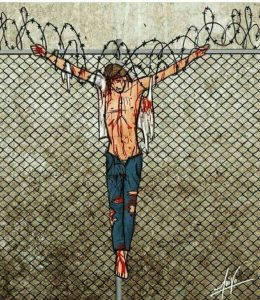 The situation we are living in is therefore not unusual and to a certain extent Brother Charles lived it, and in deep loneliness; the choice to enter into his Spiritual Family marks us very deeply even in this aspect. His experience therefore speaks to us in the heart of the destitution that we can experience, and can even become inspiring to better live this “absence”. But for this, we must return to the meaning of the presence of the “Body of Christ”, which cannot be restricted or even “confined” to the sole “real presence” of the Eucharist in the tabernacle or in the celebration. The Body of Christ has two arms, each equally “sacramental”.
The situation we are living in is therefore not unusual and to a certain extent Brother Charles lived it, and in deep loneliness; the choice to enter into his Spiritual Family marks us very deeply even in this aspect. His experience therefore speaks to us in the heart of the destitution that we can experience, and can even become inspiring to better live this “absence”. But for this, we must return to the meaning of the presence of the “Body of Christ”, which cannot be restricted or even “confined” to the sole “real presence” of the Eucharist in the tabernacle or in the celebration. The Body of Christ has two arms, each equally “sacramental”.
His Presence is not limited to that which we adore or celebrate in the Blessed Sacrament of the Altar, it is also real in what is called “the Sacrament of the Brother”. One is inspired by the Last Supper, the other by the washing of the feet. And here we are faced with the same mystery which cannot be reduced to one or the other. Christ is really present in the Sacrament of the Eucharist. He is also really present in this gesture which He makes when washing the feet of His disciples, and which signifies the Sacrament of the Brother. They complement each other, called each other, if the Sacrament is double the reality of the Presence of Jesus is one: It cannot be divided.
Eucharist and Sacrament of the Altar.
Let us return to the institution of the Eucharist on the evening of Holy Thursday: we are at a crucial moment when Jesus is going to visibly leave this Earth to join his Father, giving his life, shedding his blood “to bring together in unity the children of God dispersed ”(Jn 11,52). He will do this with a gesture that is part of the paschal meal and that he will pass on to his Apostles, who will pass it on to future generations. I refer you to the first account of the Institution that the apostle Paul relates to us in 1 Cor 11,23-26.
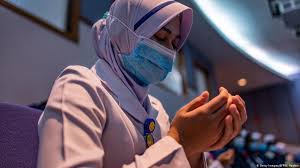 Almost from the time of Jesus’ departure from the apostolic community, the latter therefore gathered regularly, “faithful to the breaking of bread” (Acts 2,42). This was to respond to his invitation: “Do this in remembrance of me” (Lk 22:19). But it is much more about the simple repetition of a liturgical ritual. It is good to go all the way, to follow Christ by giving our life in turn for the salvation of the world, as He did. We understand here the very engaging character of the Eucharist, the celebration of which is essential in the life of the Church, and this since its birth. It has surely taken on many aspects. First celebrated in hiding, in the form of a domestic liturgy, then more openly when the Church has been able to live in visibility. And these two forms remain very current according to the possibilities and the situations, the number of the ecclesial community. The Eucharistic celebration remains one of the essential pillars of the Church.
Almost from the time of Jesus’ departure from the apostolic community, the latter therefore gathered regularly, “faithful to the breaking of bread” (Acts 2,42). This was to respond to his invitation: “Do this in remembrance of me” (Lk 22:19). But it is much more about the simple repetition of a liturgical ritual. It is good to go all the way, to follow Christ by giving our life in turn for the salvation of the world, as He did. We understand here the very engaging character of the Eucharist, the celebration of which is essential in the life of the Church, and this since its birth. It has surely taken on many aspects. First celebrated in hiding, in the form of a domestic liturgy, then more openly when the Church has been able to live in visibility. And these two forms remain very current according to the possibilities and the situations, the number of the ecclesial community. The Eucharistic celebration remains one of the essential pillars of the Church.
Even more when in her men and women engage in consecrated life. This is not a question of individual piety, but of the very meaning we give to our life: “It is not possible that we live our consecrated life in the world surrounded as we are by everything that can help us forget the Lord, if we do not courageously take the absolutely essential means to remain faithful. And the first of these means is the sacrifice of the Mass where the Lord visibly gives himself to us to strengthen us, to deprive us, to transform us little by 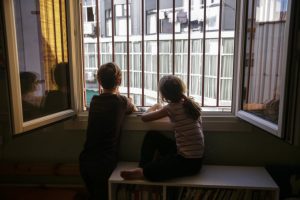 little into Him ”. (From Margot Poncet. June 1958. Diaries P. 93.) We cannot relativize attendance at Mass, as if it was only required occasionally. It is at the heart of our lives. And Eucharistic adoration prolongs it and makes us deepen our belonging to the dead and risen Christ and to the community to which we belong. But it is also for our humanity that we participate in it, as “as an embassy”. The whole Eucharist is celebrated “For the glory of God and the salvation of the world”. We put on the paten the bread of our lives and poured into the cup the wine of our sorrows and our joys, that is to say all the hope and all the suffering of our world. And we receive there the living Christ, given as food. Linked to the Communion of Saints, this celebration is uninterrupted throughout the world, whether or not we can participate in it bodily.
little into Him ”. (From Margot Poncet. June 1958. Diaries P. 93.) We cannot relativize attendance at Mass, as if it was only required occasionally. It is at the heart of our lives. And Eucharistic adoration prolongs it and makes us deepen our belonging to the dead and risen Christ and to the community to which we belong. But it is also for our humanity that we participate in it, as “as an embassy”. The whole Eucharist is celebrated “For the glory of God and the salvation of the world”. We put on the paten the bread of our lives and poured into the cup the wine of our sorrows and our joys, that is to say all the hope and all the suffering of our world. And we receive there the living Christ, given as food. Linked to the Communion of Saints, this celebration is uninterrupted throughout the world, whether or not we can participate in it bodily.
Eucharist and Sacrament of the Brother
The other arm of Christ is as essential as the one we have just mentioned, it is the one that was revealed to us during the washing of the feet, before His Glorification (Jn 13). It should be noted that the Institution of the Eucharist is not related in John’s account. It is evoked in the “sharing of bread” of chapter 5. No doubt that the “Breaking of Bread” was frequent in the Church at this late period of the 4th Gospel and that a new light had to be shed on this other Real Presence. of Jesus, manifested through our neighbor. What does Jesus say after washing the feet of his disciples? “This is an example that I have given you so that you too may do as I have done for you” (Jn 13,15). This word echoes that pronounced during the Institution: “Do this in remembrance of me” (Lk 22:19).
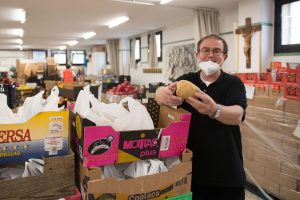 During the pandemic, the charitable work of the Church remained active, and even churches opened to welcome the poor and give them this daily bread essential to their life and that of their families. They were aided in this by a good number of volunteers from backgrounds quite indifferent to the Church. We cannot say that it has nothing to do with the Eucharist! In a meditation on the “multiplication of the loaves” (Mt 14,13-21), during the Angelus of August 2, Pope Francis comments: “In this Gospel account, the reference to the Eucharist is obvious, especially when it describes the blessing, the breaking of the bread, the giving to the disciples, the distribution to the people (v. 19). It should be noted how close the link between the Eucharistic bread, food for eternal life, and the daily bread, necessary for earthly life, is. Before offering himself as the Bread of salvation, Jesus takes care of the food of those who follow him and who, in order to be with him, have forgotten to make provisions. Sometimes spirit and matter are contrasted, but in reality spiritualism, like materialism, is alien to the Bible. “
During the pandemic, the charitable work of the Church remained active, and even churches opened to welcome the poor and give them this daily bread essential to their life and that of their families. They were aided in this by a good number of volunteers from backgrounds quite indifferent to the Church. We cannot say that it has nothing to do with the Eucharist! In a meditation on the “multiplication of the loaves” (Mt 14,13-21), during the Angelus of August 2, Pope Francis comments: “In this Gospel account, the reference to the Eucharist is obvious, especially when it describes the blessing, the breaking of the bread, the giving to the disciples, the distribution to the people (v. 19). It should be noted how close the link between the Eucharistic bread, food for eternal life, and the daily bread, necessary for earthly life, is. Before offering himself as the Bread of salvation, Jesus takes care of the food of those who follow him and who, in order to be with him, have forgotten to make provisions. Sometimes spirit and matter are contrasted, but in reality spiritualism, like materialism, is alien to the Bible. “
If Charles de Foucauld was strongly marked by the Eucharist, he was also marked by the presence of Jesus in the poor, the little, the abandoned. He wrote to Louis Massignon shortly before his death:
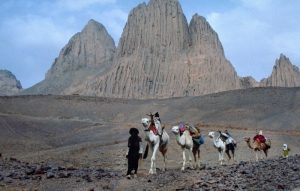 “There is no word of the Gospel that has made a deeper impression on me and transformed my life more than this: ‘Everything that you do to one of these little ones, it is to me that you do it’. If one thinks that these words are those of the uncreated Truth, those of the mouth which said ‘This is my body, this is my blood’ with what force one is brought to seek and love JESUS in these little ones, these sinners, these poor people, bringing all their material resources to the relief of temporal miseries … ”(Tamanrasset, August 1, 1916)
“There is no word of the Gospel that has made a deeper impression on me and transformed my life more than this: ‘Everything that you do to one of these little ones, it is to me that you do it’. If one thinks that these words are those of the uncreated Truth, those of the mouth which said ‘This is my body, this is my blood’ with what force one is brought to seek and love JESUS in these little ones, these sinners, these poor people, bringing all their material resources to the relief of temporal miseries … ”(Tamanrasset, August 1, 1916)
This is what unites the Sacrament of the Altar and the Sacrament of the Brother! We cannot say that opening a church to feed the poor has nothing to do with the Eucharist! We cannot say that a Christian commitment to one’s neighbor is not in the line of celebration and participation in Mass. The two arms of Christ are linked to each other, inseparable, and in celebration and in the good done to others.
The Unity of the Body of Christ.
So it is not about making a choice and separating the two for the benefit of each other. Both are in a way indispensable for the life of the Christian community, for our own and for the life of our world.
Father René Voillaume said on this subject in a conference in 1970:
“One cannot separate the sacrifice of the Cross from fraternal charity as one cannot separate a root from the plant that springs from it; we cannot separate the adoration of Christ and the communion of his mystery which is Love incarnate, from the realization of an effective and fraternal love between men. … Charity cut from its trunk which is Christ withers and dies … “
To say that separating the sacrament of the altar and the sacrament of the brother cannot be conceivable, I finally offer for your meditation the passage of a sermon by St John Chrysostom (in the 4th century) “Do you want to honor the body of Christ? Don’t despise him when he’s naked. Do not honor him here in the church with silk fabrics while you leave him outside to suffer from the cold and the lack of clothing. For he who said: “This is my body, and who realized it by saying it, it is he who said: you saw me hungry, and you gave me no food, and also: Whenever you haven’t done it to these little ones, you haven’t done it to me. Here, the body of Christ does not need clothes, but pure souls; there, he needs a lot of solicitude ”(Homily on the Gospel of St. Mt)
It is therefore up to us, where we are, to keep this link between the Sacrament of the Altar and the Sacrament of the Brother, in the conditions in which we live. God does not ask us for the impossible, He gives it to us! Let us awaken our hearts and our creativity to live from the Presence of Jesus, and to manifest Him in these times that we are living.
PDF: The Eucharist challenging the time we live. Claude RAULT. eng




